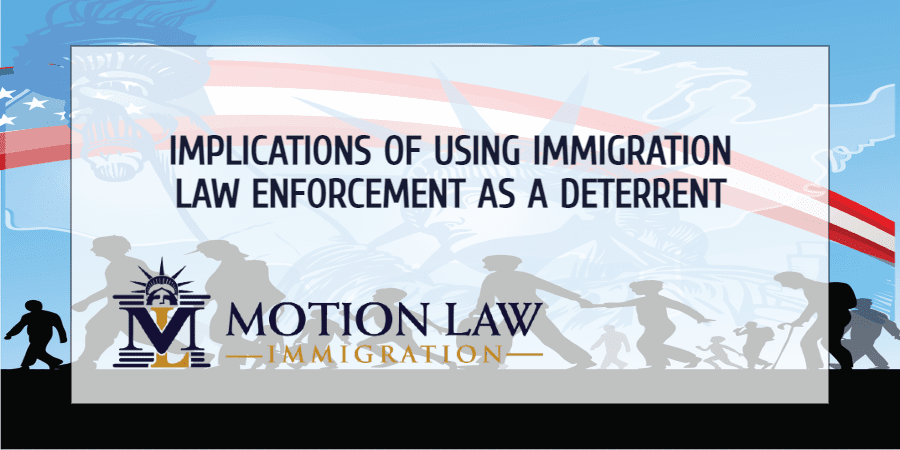Implications of Using Immigration Law Enforcement as a Deterrent

Misinformation about strict immigration policies
Irregular migration has naturally been quite a controversial issue throughout the history of the US, especially because this North American nation is the destination of millions of foreigners, who yearn to build a promising future and find economic stability.
The social debate surrounding undocumented immigrants is strongly related to the question of how the federal government could and should effectively address irregular migration in order to, essentially, encourage foreigners to follow legal processes and guidelines. A part of the American population and also numerous political leaders lean towards the idea that the only effective alternative to curb irregular migration is through restrictive and strict policies, which use immigration law enforcement and border protection as a deterrent.
However, while it might make sense to increase restrictions and “punishments” for immigrants who enter the country without legal documentation, history has taught us that restrictive policies, rather than creating lasting solutions, actually worsen the situation in the long run.
At this point it is important to explain that, according to a recent study, anti-immigrant policies come primarily from misinformation about what has happened over the past decades and the real impact of immigrant communities on the national economy.
Do you need help with an immigration case of any kind? Contact Motion Law Immigration, schedule a FREE Consultation and follow the advice of our experienced attorneys.
The law that changed the behavior of irregular migration
Irregular migration was a recurring issue in the late 1990s, when President Bill Clinton decided to intervene to change the government’s approach to immigrants residing in the US undocumented at the time.
In 1996, Clinton signed the “Illegal Immigration Reform and Immigrant Responsibility Act” (IIRIRA), which substantially increased the rules to enforce immigration law both at the borders and within the country, creating a series of “penalties” for foreigners who entered the US without prior authorization.
Some of the rules implemented through IIRIRA were:
- On the one hand, if immigrants had resided in the US without legal documentation for up to 6 months, they had to leave the country and could not return for 3 years. On the other hand, if immigrants had resided in the US without legal documentation for more than 1 year, they had to leave the country and could not return for 10 years. Since then, this has been the punishment for undocumented immigrants, something that did not happen before 1996.
- Undocumented immigrants could no longer receive legal status through a family member, spouse or employer, something that was possible before 1996. Prior to IIRIRA, undocumented immigrants could access legal documentation through these means despite having entered the country without authorization.
- The parameters and scenarios to expel both undocumented and documented immigrants were greatly increased by IIRIRA, which also exponentially increased deportation levels.
What has IIRIRA taught us?
Before 1996, there were approximately 5 million undocumented immigrants in the US and, at that time, national polls revealed that the local population tended to think that immigration in general was a negative thing for the country.
Now the scenario is literally the opposite, there are currently more than 11 million undocumented immigrants in the US and in national polls, the local population tends to argue that immigration in general is a good thing for the country.
With that in mind, official figures show that, prior to IIRIRA, 50% of undocumented immigrants from Mexico tended to return to their country within a year. Clearly, after 1996, most undocumented immigrants remained in the US due to the new guidelines implemented by Clinton.
According to an expert on the subject, “The bars were intended to try to essentially create punishments that were so severe to deter people from coming here, bus as we have seen with may deterrent-based policies the practical effect is very different.”
Visit our Blog Section and keep up to date with the latest and most relevant immigration news, policies and measures.
Do not hesitate to seek reliable help for your immigration case
If you, a family member, or a friend need help with an immigration case, then feel free to contact Motion Law Immigration today and schedule a FREE Consultation with one of our expert immigration attorneys. Our team will be happy to guide you through your immigration journey in the US.
Please contact Motion Law Immigration today at: (202) 918-1799.